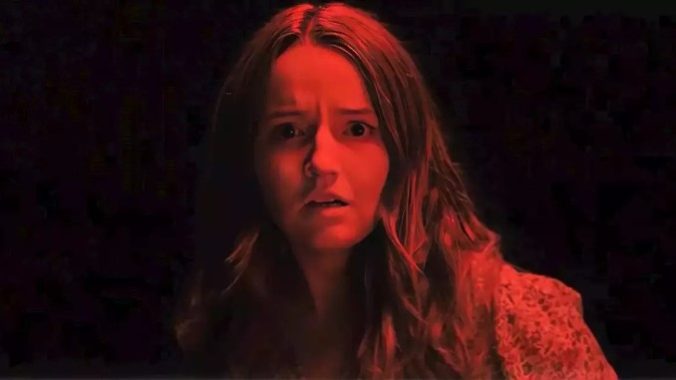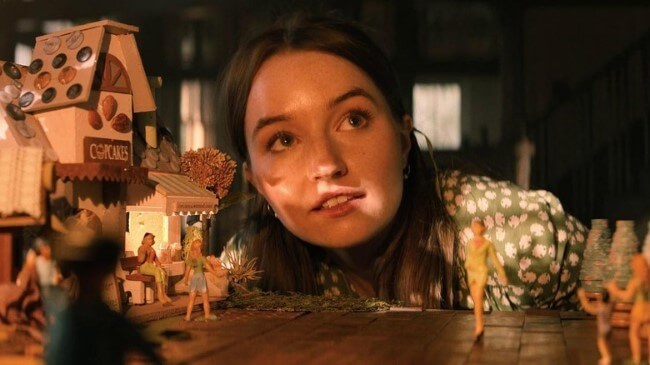No One Will Save You’s Clever Ending Critiques the Self-Centered 21st Century Protagonist

Hulu’s newly released No One Will Save You, from Spontaneous writer/director Brian Duffield, is an exercise in clever misdirection from its opening moments. Both refreshingly direct in premise and slyly subversive in its evolution and conclusion, it relies on nothing so much as the audience’s own assumptions to turn its final moments into a revelation and critique of its own main character. Duffield has skillfully employed this particular brand of cinematic judo to use our own momentum against us, understanding exactly how we’ll likely perceive Kaitlyn Dever’s silent protagonist, right up to the moment he springs a biting denouement 93 minutes in the making, leaving us laughing at the incredulity of it all.
Our dialogue-free protagonist is Brynn, a nebulously twenty-something woman seemingly living alone in a spacious but creaky old country house, where she works as a seamstress, constructs a model town a la Beetlejuice, drinks wine and generally avoids any and all human contact. The opening moments of No One Will Save You depict her home life as seemingly satisfying, until she has to venture into town for the smallest of tasks, like dropping a package in a mailbox. That simple chore is presented more like a gauntlet of anxiety Brynn is made to run, with her agonizing about choices such as what to wear and practicing her timid, fake smiles and waves in the mirror before embarking. Soon, we see why she is overwhelmed by the prospect of seeing any other person: Brynn is something of a pariah in this town, or at least a figure of distrust and scrutiny. The scowls of random passerby clearly cut her to the bone, and she lacks the courage to speak up in her defense, hoping that an insincere smile and wave will someday be greeted with affirmation rather than rejection.
![]()
The reason for Brynn’s spurning likewise becomes clear soon enough: She has a dead childhood friend, Maude, who passed away when they were in their mid-teens, and Brynn is clearly both responsible for the incident and guilty to this day. Worse, Maude’s parents still live in the town and aren’t shy in their hatred of Brynn, while our protagonist has also lost her one remaining piece of support with the recent death of her mother. And thus, she ended up alone, rattling along in her Mom’s old house while trying to stay out of sight of the town that loathes her. And that, folks, is when the alien invaders abruptly show up.
Yes, alien invaders. One can only assume that No One Will Save You must have been pitched as a feature-length adaptation of The Twilight Zone’s classic “The Invaders,” a likewise wordless story about a woman in a farmhouse, under siege by miniature alien spaceships. Decades later, that kernel of an idea has returned and been given the high-concept feature film treatment, which boils down to the following: When hostile aliens attack, can this solitary, seemingly meek woman find the fortitude necessary to survive?
This kind of high-concept simplicity and brevity of premise is a welcome thing for the film world these days, a pleasant throwback to the concise kind of elevator pitch that spawned so many beloved B-movies in the 1980s in particular. It’s comfortably familiar, the kind of church-mouse-into-badass-warrior transformation we’ve seen again and again over the decades. And yet, in the case of No One Can Save You, that premise functions both as a simple promise of pulpy entertainment and as misdirection preying on the audience’s built-in familiarity with tropes, in order to frame our perception of Brynn has a heroine.
Suffice to say, there are ways that a character in Brynn’s position, dropped into this sort of story, is meant to behave. We expect this kind of protagonist to steadily grow from timid and unsure of themselves to battle-hardened and confident, baptized in the line of fire and emerging far stronger on the other side. We expect them to be selfless, to confront their inner demons and conquer them while simultaneously being ready to sacrifice themselves for the lives of others. And perhaps more than anything, we expect this kind of protagonist to act as a bastion of defiance against the alien invaders, a champion of humankind who steadfastly stands up for our way of life and very right to exist. This protagonist fights for our freedom! They are the best of us, or at least the most human of us, proud of the human spirit in all its messy glory. This is the stuff that so wonderfully makes up the drunken speech at the end of Edgar Wright’s The World’s End, as Simon Pegg gleefully tells off a vastly superior alien intellect.
But this isn’t really all that realistic, is it? Perhaps it’s reasonable to expect the average person to “fight back” against an inhuman intruder in terms of physically defending themselves and saving their own skin, but when it comes to saving the rest of us, is that not outside the reasonable realm of what one could probably hope to achieve? And what if you find yourself coming to the conclusion that there isn’t much in humanity you feel any particular impetus to save? What if your protagonist ultimately doesn’t look much farther beyond their day-to-day experience? Well, then you end up with the ending of No One Will Save You.
It’s not that Brynn doesn’t fight ferociously against the threat to her life. She does, first instinctually and then with planning and vicious execution when the aliens return. As long as the intruders seem intent on killing her, she refuses to back down or give up in the physical and mental battle against them.
But then a curious thing happens. When Brynn is eventually abducted by the alien craft, they psychically probe her memories and emotions, witnessing the history of her trauma and seemingly coming to a greater understanding of people, or at least of Brynn personally, in the process. The aliens then return her to the ground, having presumably gotten what they wanted … and they notably do not try for a second time to implant her with a mind-controlling, tentacled creature, which they’ve successfully used to enslave and puppet all the other people in her town.








































